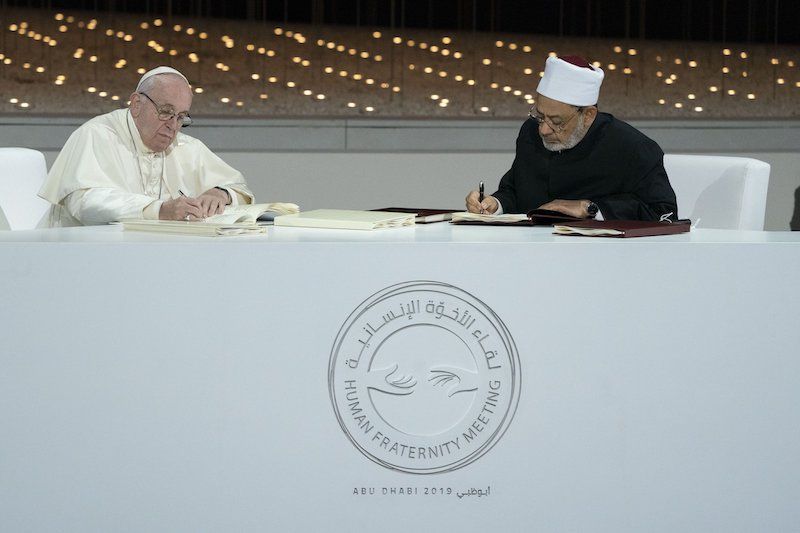A Canadian Muslim Perspective on Pope Francis’ Encyclical, Fratelli Tutti

By Muneeb Nasir
Fratelli Tutti, the latest encyclical of Pope Francis, is a passionate call to the higher moral ideal of fraternity to dispel the ‘dark clouds’ hanging over the world.
Pope Francis reminds us of the inherent dignity of each human being – an inherent dignity that all religions uphold – in the Quran, God asserts, “We have bestowed dignity on the children of Adam.”
Pope Francis posits that fraternity is reborn when we acknowledge the dignity of each human person.
This Encyclical covers the many social ills facing the world and, throughout the document, Pope Francis threads the parable of Good Samaritan and engages in spiritual discernment, asking us to not just lament about the ills of the world but, like the Good Samaritan, ‘see things right.’
“Today we have a great opportunity to express our innate sense of fraternity, to be Good Samaritans who bear the pain of other people’s troubles rather than fomenting greater hatred and resentment. Like the chance traveller in the parable, we need only have a pure and simple desire to be a people, a community, constant and tireless in the effort to include, integrate and lift up the fallen.’
From an interreligious perspective, I wish offer the following 3 points on what I appreciate about this encyclical and what it means for interfaith and Christian-Muslim relations.
FIrst, Pope Francis, in all his writings, is not just concerned with providing theological reflections or “abstract moralizing.”
He offers the Encyclical “with a new vision of fraternity and social friendship that will not remain at the level of words.”
From the beginning of his papacy, Pope Francis has not lived at the level of words and this is quite important for interreligious relations.
Pope Francis models a dialogue of action and he has significantly worked to improve Catholic-Muslim relations.
Second, the encyclical’s message is clearly influenced by his meeting with the Grand Imam of Al-Azhar, Shaykh Ahmad At-Tayyab in 2019 where they signed the “Document on Human Fraternity for World Peace and Living Together.”
The encyclical develops the themes discussed in that document.
But the Fratelli Tutti encyclical is also influenced by the historic meeting between St. Francis of Assisi and Sultan Malik al-Kamil in 1219 as the fifth crusade was in progress.
Even though the story of the encounter between Francis of Assisi and Malik Al-Kamil was ignored for centuries, it sowed a seed which has now grown and begun to bear good fruit through Pope Francis.
It is reported that when St. Francis of Assissi was asked why he crossed into the Muslim camp, he responded, ‘We are ambassadors of the Lord.’
Sultan Malik Al-Kamil must have seen the distinction that St. Francis drew – he was coming as God’s ambassador and not the Pope’s.
What we can learn here from this encounter is that when we relate to each other as children of Adam we can find common ground despite our differences.
Pope Francis draws inspiration from St. Francis of Assisi and he has gone out of his way to encounter Muslims very much like Fancis of Assisi and, as he says in Fratelli Tutti, ‘this is not a mere diplomatic gesture, but a reflection born of dialogue and common commitment.’
These meetings – the historic one between St. Francis of Assisi and Malik Al-Kamil and the contemporary one between Pope Francis and Imam Ahmad al-Tayyeb – serve as models for social solidarity and encourage us to develop a ‘culture of encounter.’
Third, I most appreciated this line in the encyclical, “The Church esteems the ways in which God works in other religions” (which restates the position of the Church from 1965 Second Vatican Council declaration, Nostra aetate).
This line could also be speaking to a dialogue of faith that Pope Francis had in mind in the joint document he signed with Imam Ahmad al-Tayyeb, where they said that “the pluralism and the diversity of religions … are willed by God in His wisdom.”
And this very much resonates with Muslims as it mirrors the Islamic teachings.
Finally, we must ask how we can use and benefit from Fratelli Tutti.
in the “Document on Human Fraternity for World Peace and Living Together,” Pope Francis and Imam Ahmad al-Tayyeb wrote “Al-Azhar and the Catholic Church ask that the Document become the object of research and reflection in all schools, universities and institutes of formation, thus helping to educate new generations to bring goodness and peace to others, and to be defenders everywhere of the rights of the oppressed and of the least of our brothers and sisters.”
Similarly, I think that Fratelli Tutti should become the object of study and reflection for all who wish to address the social ills and dark clouds hanging over the world and build a more just and fraternal world.
Let me conclude with the appeal for peace, justice and fraternity that Pope Francis and Imam Shaykh Ahmad at-Tayyeb made together in 2019 and which offers 3 points for building fraternity:
“In the name of God and of everything stated thus far, [we] declare the adoption of a culture of dialogue as the path; mutual cooperation as the code of conduct; reciprocal understanding as the method and standard.”
[Presentation by Muneeb Nasir at the virtual panel discussion, ‘Religions at the Service of Fraternity in Our World’ held on January 28, 2021 and organized by the Office for Interreligious Dialogue, Roman Catholic Archdiocese of Toronto. Muneeb Nasir is the Co-Chair of the National Muslim Christian Liaison Committee.]
